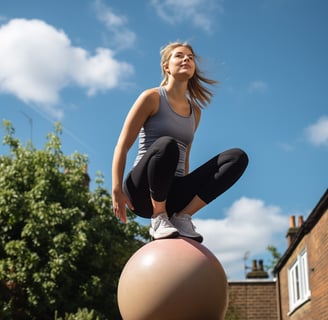Gut Microbes: The Undiscovered Key to Motivating Exercise?
The human body is an intricate ecosystem, and new studies have revealed an intriguing link between our gut bacteria and our desire to exercise. It turns out that our want to move is significantly influenced by the trillions of bacteria that live in our intestines.
1/2/20242 min read


The human body is an intricate ecosystem, and new studies have revealed an intriguing link between our gut bacteria and our desire to exercise. It turns out that our want to move is significantly influenced by the trillions of bacteria that live in our intestines.
The Axis of the Gut-Brain: A Link to Motivation
The gut-brain axis is a bidirectional communication route that runs deeply between our stomach and brain. The two organs can communicate with each other through this complex network, which affects a variety of physiological functions such as motivation, appetite, and mood.
Microbes as Ambassadors: Signifying the Advantages of Physical Activity
Scientists are currently investigating the potential impact of gut bacteria on exercise motivation. Research has indicated that certain types of intestinal bacteria can generate short-chain fatty acids (SCFAs), which function as signalling molecules in the brain. By interacting with the brain, these SCFAs can enhance the body's response to exercise.
Faecalibacterium Prausnitzii's Function
Faecalibacterium prausnitzii, one specific type of gut bacteria, has come to light as a major regulator of exercise motivation. High concentrations of the SCFA butyrate, which this bacterium is known to produce, have been demonstrated to raise dopamine levels in the brain. An elevated level of dopamine, a neurotransmitter linked to pleasure and reward, may heighten the desire to work out.
Maintaining a Healthy Microbiome to Increase Motivation for Exercise
It's clear that keeping a healthy gut microbiome is essential for developing a persistent desire to exercise, given the role that gut microorganisms play in regulating exercise motivation. This entails consuming a well-balanced, high-fiber diet, which provides a supportive environment for good gut flora.
Supplemental Probiotics: A Possible Enhancer
Supplements containing live beneficial bacteria, known as probiotics, have demonstrated potential in raising motivation to exercise. Probiotic use has been linked to higher gut levels of short-chain fatty acids (SCFAs), which may promote better adherence to exercise regimens.
Interactions between Exercise and Gut Microbes: A Two-Way Street
It's crucial to understand that there is a reciprocal relationship between gut bacteria and exercise. The act of exercising itself has the potential to impact our gut microbiome's composition. Regular exercise has been demonstrated in studies to increase the number of advantageous gut bacteria, which may further boost exercise motivation.
Taking Care of Your Gut for a Healthier Lifestyle
There is strong evidence to support the importance of gut health due to the link between gut microorganisms and exercise motivation. Keeping our microbiota in good health may increase our desire to exercise, which could have a domino effect on other positive health outcomes.
In summary
Research on the impact of gut microorganisms on exercise motivation is an exciting field with broad applications. Understanding the signalling pathways associated with the gut-brain axis can help us develop more effective strategies for encouraging an active and healthy lifestyle. As we investigate this relationship more, we might discover fresh approaches to improving exercise compliance and general health.
